- Home
- Wendell Berry
The Selected Poems of Wendell Berry Page 8
The Selected Poems of Wendell Berry Read online
Page 8
Ben said, without raising his voice, in the same reasonable tone in which he had been speaking to Dave, “Hold on, Thad.”
And Thad fired.
Dave saw a small round red spot appear in the center of Ben’s forehead. A perplexed look came to his face, as if he had been intending to say something more and had forgot what it was. For a moment, he remained standing just as he had been, one hand on the rim of the wagon box. And then he fell. As he went down, his shoulder struck the hub of the wagon wheel so that he fell onto his side, his hat rolling underneath the wagon.
Thad put the pistol back into his pocket. The mule had stood as still after he had halted her as if she were not there at all but at home under a tree in the pasture. When Thad kicked her, she went on again.
Ben Feltner never had believed in working on Sunday, and he did not believe in not working on workdays. Those two principles had shaped all his weeks. He liked to make his hay cuttings and begin other large, urgent jobs as early in the week as possible in order to have them finished before Sunday. On Saturdays, he and Mat and the hands worked in the crops if necessary; otherwise, that day was given to the small jobs of maintenance that the farm constantly required and to preparations for Sunday, when they would do nothing except milk and feed. When the work was caught up and the farm in order, Ben liked to have everybody quit early on Saturday afternoon. He liked the quiet that descended over the place then, with the day of rest ahead.
On that Saturday morning he had sent Old Smoke, Aunt Cass’s husband, and their son, Samp, and Samp’s boy, Joe, to mend a fence back on the river bluff. Mat he sent to the blacksmith shop to have the shoes reset on Governor, his buggy horse. They would not need Governor to go to church; they walked to church. But when they had no company on Sunday afternoon and the day was fair, Ben and Nancy liked to drive around the neighborhood, looking at the crops and stopping at various households to visit. They liked especially to visit Nancy’s brother, Jack Beechum, and his wife, Ruth, who lived on the Beechum place, the place that Nancy always spoke of as “out home.”
And so Mat that morning, after his chores were done, had slipped a halter on Governor and led him down through town to the blacksmith’s. He had to wait—there were several horses and mules already in line—and so he tied Governor to the rail in front of the shop and went in among the others who were waiting and talking, figuring that he would be late for dinner.
It was a good place. The shop stood well back from the street, leaving in front of it a tree-shaded, cinder-covered yard, which made room for the hitch rail and for the wagons, sleds, and other implements waiting to be repaired. The shop itself was a single large, dirt-floored room, meticulously clean—every surface swept and every tool in place. Workbenches went around three walls. Near the large open doorway were the forge and anvil.
The blacksmith—a low, broad, grizzled man by the name of Elder Johnson—was the best within many miles, a fact well known to himself, which sometimes made him difficult. He also remembered precisely every horse or mule he had ever nailed a shoe on, and so he was one of the keepers of the town’s memory.
Elder was shoeing a colt that was nervous and was giving him trouble. He was working fast so as to cause the colt as little discomfort as he could. He picked up the left hind hoof, caught it between his aproned knees, and laid the shoe on it. The shoe was too wide at the heel, and he let the colt’s foot go back to the floor. A small sharp-faced man smoking a cob pipe was waiting, holding out a broken singletree for Elder’s inspection as he passed on his way back to the forge.
Elder looked as if the broken tree were not the sort of thing that could concern him.
“Could I get this done by this evening?” the man asked. His name was Skeets Willard, and his work was always in some state of emergency. “I can’t turn a wheel,” he said, “till I get that fixed.”
Elder let fall the merest glance at the two pieces of the singletree, and then looked point-blank at the man himself as if surprised not only by his presence but by his existence. “What the hell do you think I am? A hammer with a brain? Do you see all them horses and mules tied up out there? If you want that fixed, I’ll fix it when I can. If you don’t, take it home.”
Skeets Willard elected to lay the pieces down in a conspicuous place by the forge. And Elder, whose outburst had not interrupted the flow of talk among the bystanders, caught the shoe in his tongs and shoved it in among the coals of the forge. He cranked the bellows and made small flames spike up out of the coals. As he turned the handle, he stared in a kind of trance at the light of the open doorway, and the light shone in his eyes, and his face and his arms were shining with sweat. Presently he drew the shoe, glowing, out of the coals and, laying it on the horn of the anvil, turned in the heel. He then plunged the shoe into the slack tub from which it raised a brief shriek of steam.
Somebody turned out of the conversation and said, “Say, Elder, do you remember that little red mule come in here with a bunch of yearlings Marce Catlett bought up around Lexington? Ned, I think they called him.”
“Newt,” Elder said in so even a voice that Skeets Willard might never have been there. “You bet I remember him.”
He took the cooled shoe from the slack tub and, picking up the colt’s foot and straddling it again, quickly nailed one nail in each side, raking the points over with the claws of his hammer. He let the colt stand on his foot again to see how the shoe set. “You bet I remember him,” he said. “That mule could kick the lard out of a biscuit.”
And then they heard the single voice raised in warning out in the road, followed immediately by the shot and by a rising murmur of excited, indistinguishable voices as the whole Saturday crowd turned its attention to the one thing.
Mat hurried out with the others and saw the crowd wedged in between the storefronts and Dave Coulter’s wagon. He only began to realize that the occasion concerned him when the crowd began to make way for him as he approached.
“Let him through! Let him through!” the crowd said.
The crowd opened to let him through, turning its faces to him, falling silent as it saw who he was. And then he saw what was left of the man who had been his father lying against the wagon wheel. Those nearest him heard him say, “Oh!” and it did not sound like him at all. He stepped forward and knelt and took his father’s wrist in his hand to feel for the pulse that he did not expect, having seen the wound and the fixed unsighted eyes. The crowd now was as quiet around him as the still treetops along the road. For what seemed a long time Mat knelt there with his father’s dead wrist in his hand, while his mind arrived and arrived and yet arrived at that place and time and that body lying still on the soiled and bloodied stones. When he looked up again, he did not look like the man they had known at all.
“Who did this?” he said.
And the crowd answered, “Thad Coulter, he done it.”
“Where’d he go?”
“He taken down the road yonder towards Hargrave. He was on that old white mule, old May.”
When Mat stood up again from his father’s side, he was a man new-created by rage. All that he had been and thought and done gave way to his one desire to kill the man who had killed his father. He ached, mind and body, with the elation of that one thought. He was not armed, but he never thought of that. He would go for the horse he had left tied at the blacksmith’s. He would ride Thad Coulter down. He would come up beside him and club him off the mule. He would beat him down out of the air. And in that thought, which lived more in his right arm than in his head, both he and his enemy were as clear of history as if newborn.
By the time Mat was free of the crowd, he was running.
Jack Beechum had sold a team of mules the day before, and so he had a check to carry to the bank. He also had a list of things that Ruth wanted from town, and now that he had money ahead he wanted to settle his account at Chatham’s store. His plan was to do his errands in town and get back home by dinner; that afternoon, he wanted to mow a field of hay, hoping i
t would cure by Monday. He rode to town on a good black gelding, called Socks for his four white pasterns.
He tied the horse some distance from the center of town in a place of better shade and fewer flies. He went to the bank first and then went about gathering the things that Ruth needed, ending up at Chatham’s. He was sitting by Beater Chatham’s desk in the back, watching Beater total up his account, when they heard the shot out in the street.
“Sounds like they’re getting Saturday started out there,” Jack said.
“I reckon,” Beater said, checking his figures.
“They’re going to keep on until they shoot somebody who don’t deserve it.”
Beater looked at him then over the tops of his glasses. “Well, I reckon they’ll have to look hard to find him.” He filled out a check for the amount of the bill and handed the check to Jack for him to sign.
And then somebody who had just stepped out of the store stepped back in again and said, “Jack, you’d better come. They’ve shot Ben Feltner.”
Jack never signed the check that day or for several days. He ran to the door. When he was outside, he saw first the crowd and then Mat running toward him out of it. Without breaking his own stride, he caught Mat and held him.
They were both moving at some speed, and the crowd heard the shock of the impact as the two men came together. Jack could hardly have known what he was doing. He had had no time to think. He may have been moved by an impulse simply to stop things until he could think. At any rate, as soon as Jack had taken hold of Mat, he understood that he had to hold him. And he knew that he had never taken hold of any such thing before. He had caught Mat in a sideways hug that clamped his arms to his sides. Jack’s sole task was to keep Mat from freeing his arms. But Mat was little more than half Jack’s age; he was in the prime of his strength. And now he twisted and strained with the concentration of fury, uttering cries that could have been either grunts or sobs, forcing Jack both to hold him and to hold him up. They strove there a long time, heaving and staggering, and the dust rose up around them. Jack felt that his arms would pull apart at the joints. He ached afterward. Something went out of him that day, and he was not the same again.
And what went out of Jack came into Mat. Or so it seemed, for in that desperate embrace he became a stronger man than he had been. A strength came into him that held his grief and his anger as Jack had held him. And Jack knew of the coming of this strength, not because it enabled Mat to break free but because it enabled Jack to turn him loose. He stepped away, allowing himself to be recognized, and Mat stood still. To Jack, it was as though he had caught one man and let another go.
But he put his eye on Mat, not willing yet to trust him entirely to himself, and waited.
They both were winded, wet with sweat, and for a moment they only breathed, watched by the crowd, Jack watching Mat, Mat looking at nothing.
As they stood so, the girl, Martha Elizabeth, walked by in the road. She did not look at them or at the wagon or at the body crumpled on the ground. She walked past it all, looking ahead, as if she already saw what she was walking toward.
Coming aware that Jack was waiting on him, Mat looked up; he met Jack’s gaze. He said, “Pa’s dead. Thad Coulter has shot him.”
They waited, looking at each other still, while the earth shook under them.
Mat said, “I’ll go tell Ma. You bring Pa, but give me a little time.”
Dinner was ready, and the men were late.
“It wasn’t usual for them to be late,” my grandmother said, “but we didn’t think yet that anything was wrong. Your mother was just a little girl then, and she was telling us a story about a girl and a dog and a horse.”
Aunt Cass stood by the stove, keeping an eye on the griddle. Nancy was sweeping the floor under the firebox of the stove; she was a woman who was always doing. Margaret, having set the table, had turned one of the chairs out into the floor and sat down. All three were listening to Bess, who presently stopped her story, rolled her eyes, and said, “I hear my innards a-growling. I reckon I must be hungry.”
They laughed.
“I spect so, I spect so,” Aunt Cass said. “Well, you’ll eat fore long.”
When she heard Mat at the kitchen door, Aunt Cass said, “Miss Nancy, you want to take the hoecake up?” And then seeing the change in Mat’s face, which was new to it but old to the world, she hushed and stood still. Nancy, seeing the expression on Cass’s face, turned to look at Mat.
Bess said, “Goody! Now we can eat!”
Mat looked at his mother and then down at Bess and smiled. “You can eat directly,” he said.
And then he said, “Margaret, take Bess and go upstairs. I think she’s got a book up there she wants you to read to her.”
“I knew what it was then,” my grandmother said. “Oh, I felt it go all over me before I knew it in my mind. I just wanted to crawl away. But I had your mother to think about. You always have somebody to think about, and it’s a blessing.”
She said, “Come on, Bess, let’s go read a story. We’ll eat in a little bit.”
As soon as he heard their footsteps going up the stairs, Mat looked at his mother again. As the silence gathered against him, he said, “Ma, I’m sorry. Pa’s dead.”
She was already wearing black. She had borne four children and raised one. Two of her children she had buried in the same week of a diphtheria epidemic, of which she had nearly died herself. After the third child had died, she never wore colors again. It was not that she chose to be ostentatiously bereaved. She could not have chosen to be ostentatious about anything. She was, in fact, a woman possessed of a strong native cheerfulness. And yet she had accepted a certain darkness that she had lived in too intimately to deny.
She stood, looking at Mat, while she steadied herself and steadied the room around her, in the quiet that, having suddenly begun there, would not end for a long time. And then she said to Mat, “Sit down.”
She said, “Cass, sit down.”
They turned chairs away from the table and sat down, and then she did.
“Now,” she said, “I want to know what happened.”
In the quiet Mat told as much, as little, as he knew.
As if to exert herself against the silence that too quickly filled the room, Nancy stood again. She laid her hand on the shoulder of Mat’s wet shirt and patted it once.
“Cass,” she said, “we mustn’t cry,” though there were tears on her own face.
“Mat,” she said, “go get Smoke and Samp and Joe. Tell them, and tell them to come here.”
To Aunt Cass again, she said, “We must fix the bed. They’ll need a place to lay him.”
And then they heard the burdened footsteps at the door.
In his cresting anger in the minutes before he stopped the mule in the road in Port William and fired the one shot that he ever fired in anger in his life, Thad Coulter knew a fierce, fulfilling joy. He saw the shot home to the mark, saw Ben Feltner stand a moment and go down, and then he kicked the mule hard in the side and rode on. He went on because all behind him that he might once have turned back to was gone from his mind, and perhaps even in his joy he knew that from that time there was to be no going back.
Even before the town was out of sight behind him, his anger and his joy began to leave him. It was as if his life’s blood were running out of him, and he tried to stanch the flow by muttering aloud the curses of his rage. But they had no force, and his depletion continued.
His first thought beyond his anger was of the mule. She was thirsty, he knew, and he had denied her a drink.
“When we get to the creek,” he said.
The mule followed the windings of the road down off the upland. Below the cleared ridges, they passed through woods. On the gentler open slopes below, they came into the blank sunlight again, and he could see the river winding between its wooded banks toward its meeting with the Ohio at Hargrave.
At the foot of the hill, the road dipped under trees again and forded a creek. Thad rod
e the mule into the pool above the ford, loosened the rein, and let her drink. It was a quiet, deeply shaded place, the water unrippled until the mule stepped into it. For the first time in three days Thad could hear the quiet, and a bottomless sorrow opened in him, causing him suddenly to clutch his belly and groan aloud.
When the mule had finished drinking, he rode her out of the pool, dismounted, and, unbuckling one end of the rein from the bit, led her into a clump of bushes and tall weeds and tied her there. For now the thought of pursuit had come to him, and he knew he would have to go the rest of the way on foot. The mule could not be hurried, and she would be difficult to hide.
He went back to the pool and knelt at the edge of it and drank, and then he washed his hands and in his cupped hands lifted the clear water to his face.
Presently, he became still, listening. He had heard, he thought, nothing but the cicadas in the surrounding trees. And then he heard, coming fast, the sound of loud talking and the rapid hooftread of horses. He stepped into a patch of weeds and watched several riders go by on the road. They were boys and young men from the town who, having waited through the aftermath of the shooting, had now been carried by their excitement into pursuit of him. “Boys,” he thought. He felt in no danger from them—he did not think of the pistol—and yet he feared them. He imagined himself hurrying on foot along the road, while the young riders picked and pecked at him.
The quiet returned, and he could feel, as if in the hair roots and pores of his skin, that Martha Elizabeth was coming near. He went back to the road again.
The walking and the water drying on his face cleared his mind, and now he knew himself as he had been and as he was and knew that he was changed beyond unchanging into something he did not love. Now that his anger had drained away, his body seemed to him not only to be a burden almost too heavy to carry but to be on the verge of caving in. He walked with one hand pressed to his belly where the collapse seemed already to have begun.

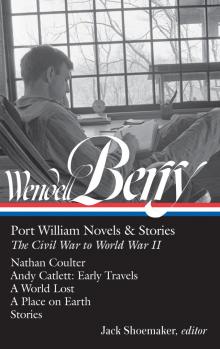 The Selected Poems of Wendell Berry
The Selected Poems of Wendell Berry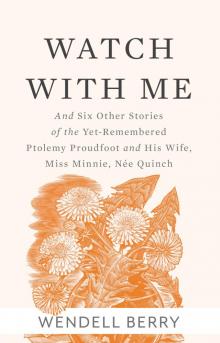 Watch With Me
Watch With Me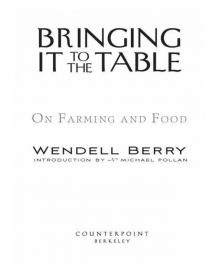 Bringing It to the Table: On Farming and Food
Bringing It to the Table: On Farming and Food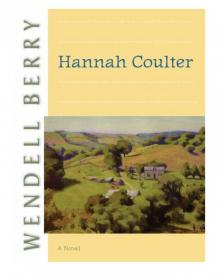 Hannah Coulter
Hannah Coulter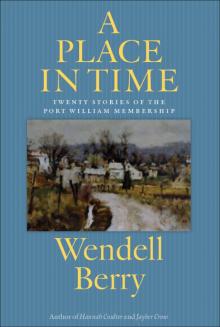 A Place in Time: Twenty Stories of the Port William Membership
A Place in Time: Twenty Stories of the Port William Membership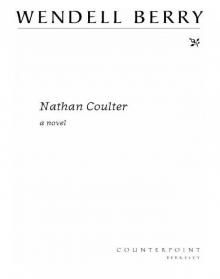 Nathan Coulter
Nathan Coulter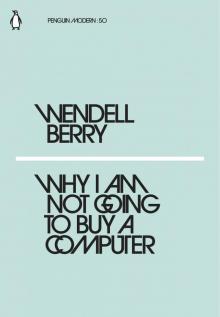 Why I Am Not Going to Buy a Computer
Why I Am Not Going to Buy a Computer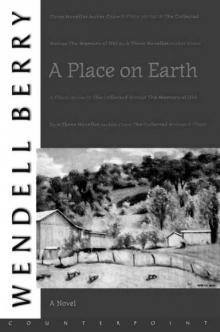 A Place on Earth
A Place on Earth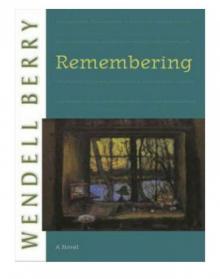 Remembering
Remembering New Collected Poems
New Collected Poems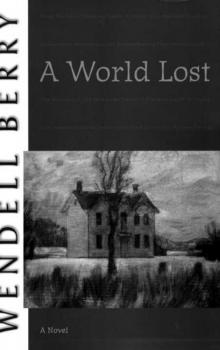 A World Lost
A World Lost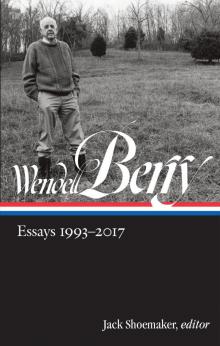 Wendell Berry
Wendell Berry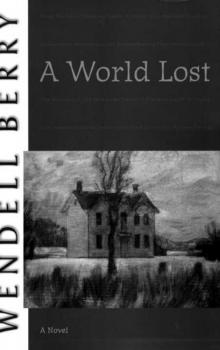 A World Lost: A Novel (Port William)
A World Lost: A Novel (Port William)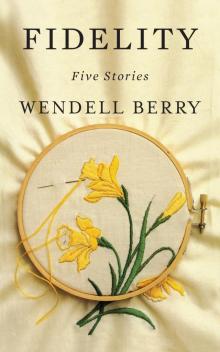 Fidelity
Fidelity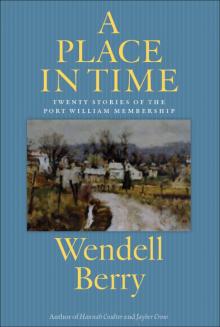 A Place in Time
A Place in Time